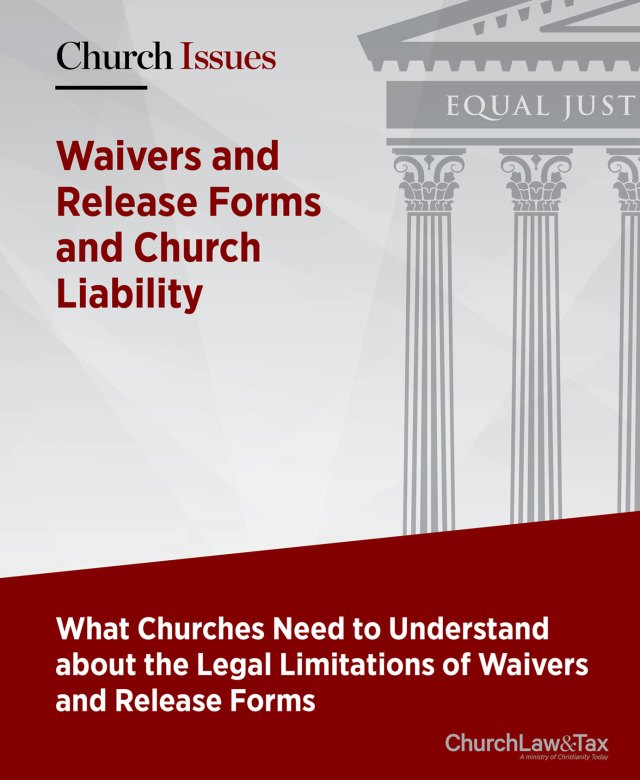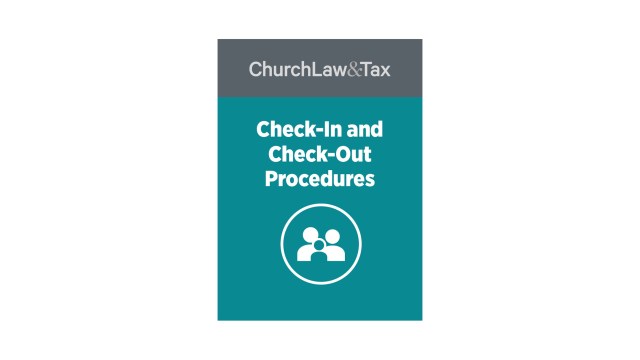A gust of wind propels a bounce house and its cargo of small children across a field.
People chase after a bucking bull to try to claim the $100 bills impaled on each of the animal’s horns.
Two boys place metal garbage cans over the heads and race toward each other. The ensuing collision renders one of the boys a quadriplegic.
These three incidents all occurred during church special events. Though dramatic, they illustrate the real need for ministry leaders to plan special events carefully and involve insurance companies and attorneys in the process.
A special event is anything that happens outside the normally scheduled operations of a church, both onsite and offsite. The appeal is obvious: adding variety and a sense of excitement to a church’s “regularly scheduled programming.” However, much can go wrong during these events, even perhaps serious injury, death, or costly legal judgments.
A common mistake that churches make is to assume that it is covered for special events under an existing umbrella insurance policy. That’s not necessarily the case.
“For anything that is outside the normal scope of operations, they cannot assume they have insurance,” said Paula Burns, an agent for Insurance One Agency of Woodland, Texas. So what can you do to ensure that your church isn’t navigating into risky territory with your planned event?
Assess the risk—and be willing to say no
What can seem like a good idea in the early stages of event brainstorming can become a serious safety situation or legal liability. Your church’s first planning questions must be:
- Should we hold this event at all?
- If so, will the event be covered by insurance?
If a church has limited experience or limited control over the event, or if the event is inherently dangerous, a church may want to try another idea.
Insurance agents usually like to say yes to an event—but churches should not assume automatic assent. In addressing the above-mentioned examples, Burns was skeptical about covering the event involving the bull, especially when she learned that a 68-year-old grandmother had claimed the prize the previous year.
“I asked the pastor if he felt like God was telling him to have this event. He leaned back and said, ‘I can’t say that he is.’ I then recommended they not hold that event anymore,” Burns said.
In this context, novelty may attract a crowd, but unusual events can also draw big trouble. “If it’s something no one’s ever done before, there’s probably a reason for that,” said John Hein, corporate legal counsel for Brotherhood Mutual Insurance Company, which insures more than 40,000 churches nationwide. “It was probably unreasonably or inherently dangerous.”
As you’re planning, consider the possible risks carefully. A well-rounded rubric for assessment will include these questions:
Will there be adequate adult supervision?
“An adult needs to sit down and ask, ‘how could things go wrong here?’ Rarely do we see something that could not have been prevented,” said Frank Sommerville, a Texas attorney who specializes in church law and a senior editoral advisor for Church Law & Tax. “I think most 18-, 19-, or 20-year-olds aren’t mature enough to be the adults providing the supervision.”
What are the onsite risks”
Guests unfamiliar with the property should be directed to where they need to be, through well-lit and well-marked passageways.
What are the offsite risks?
Offsite risks are inherently more dangerous than onsite events because the church is less knowledgeable of the venue, said Dave Lantz, vice president of claims for Brotherhood Mutual. “We want churches to look over the rental or lease agreement with local counsel or our legal department to make sure they are protected and not assuming liability for conditions they don’t have control over,” Lantz said.
What about transportation to offsite events?
Are private vehicles being used? The church van? Adequate coverage must be obtained in each case. If a group is chartering buses and traveling to another state, the church must verify the bus line and its drivers are licensed and properly insured for interstate commerce.
“Transportation is one commonly overlooked detail for churches planning special events,” said Eric Spacek of GuideOne, an insurer of 43,000 churches in the U.S. “If people are driving on behalf of the church, whether in church-owned, rented, or personal vehicles, their driving records should be checked to make sure they are appropriate for this responsibility, particularly when minors are involved. While there have been some safety improvements in 15-passenger vans, alternatives, such as mini-buses or minivans, should be strongly considered.”
Regardless of what vehicle is used, a pre-trip inspection should take place to make sure it is in good working order. The church should verify that those driving their personal vehicles are adequately insured. Lastly, if a transportation company is hired to do the driving, the church should check references on the company and obtain proper proof of insurance.
Is the weather favorable?
If bad weather hits on the day of the event, either have alternate plans or cancel it if it might increase the risks associated with the event or the transportation needed.
“Because so much planning goes into a special event, church leaders can be hesitant to call it off when bad weather hits,” Spacek said. “Leaders should take a dispassionate look at the circumstances, and if significant questions about safety arise because of the weather, they should strongly consider alternative plans, including postponing or cancelling the trip.”
When deciding whether or not to call of an event, disappointment over the cancellation should not outweigh the heartache that could ensue if the trip continues despite conditions and an accident occurs.
As part of your planning and assessment process, provide timely information to an insurance agent before the event. Paula Burns asks churches to send a narrative of the event at least 30 days in advance. The narrative will describe the event, where it will take place, the names of those who will supervise it, what will take place, and list the vendors and other outside parties involved.
Understand special concerns
Popular events, and dealing with the vendors who help provide them, carry extra risks and liabilities that agents and underwriters want to see your church avoid. For the sake of example, here are two common event attractions with appropriate suggestions:
Inflatables/bounce houses
Many injury claims arise because either there are too many people inside or big kids are inside with smaller kids. Inflatables on a hard surface also pose an injury risk if someone falls off. If an inflatable is outdoors, make sure it is secured. If the weather is bad, do not allow anyone inside.
Check with your state to see if it requires inspection of bounce houses. “Having trained staff set up, operate, and supervise all inflatable recreation is essential,” said Church Mutual Risk Control Manager Ed Steele. “Another key to safe usage is to follow the manufacturer’s height and weight limits.” By height, he means that of each individual user and by weight, the collective weight of all users.
Skate parks
Churches host skateboarding events that use temporary ramps constructed by vendors. Appropriate safety equipment, such as helmets and pads, can minimize injury risks and the severity of injuries that occur.
Make sure that liability and coverage issues are settled with vendors before they set up. Ask vendors to provide a copy of their compliance stickers and check your state’s website to see if they are on the list of approved vendors. Be willing to insist on proof of insurance from a vendor.
“It’s not uncommon for vendors to want to have the ministry that is hiring them to assume all risks of loss,” Hein said. “But that’s not equitable. The vendors should have their own policy and the insured [church] should be able to obtain a certificate of insurance from the vendor. At the very least, the certificate has to have an endorsement added to the vendor’s policy that would name the ministry as an additional insured.”
Use waivers and hold-harmless agreements
If a special event could potentially lead to injury or illness, churches should ask participants, or parents of participating youth, to sign a permission/consent form for the specific activity and for emergency medical treatment as may be necessary. These agreements should be as specific as possible, including potential risks, even the risk of death, such as in boating outings or ski trips.
Spacek recommends that churches also consider having adults sign a waiver of liability. “For minors, such waivers of liability are not enforceable in many states,” he said. The usefulness of a waiver depends on state law, the language it contains, and the kind of negligence that may be involved in an incident. “Consult with your churchs local legal counsel about appropriate permission/consent and waiver forms for your event,” said Spacek.
Church Mutual’s vice president of claims, Brian Arndorfer, said, “We recommend waivers as a matter of good business practice. However, a parent cannot waive their minor child’s rights except in a couple of states. Nevertheless, waivers serve the purpose of advising parents of the nature of the activity and the risk.”
“You can’t really say that a waiver will always protect the church, but life is better with the waiver than without,” Sommerville said. “The more specific the waiver is, the more likely it is that it will be enforced. You also don’t want a general waiver that waives all liability for any accidents that may take place in the next year. That is so general that the odds of it being enforced are almost zero.”
Find partners in protection
Insurance agencies and attorneys should be your church’s partners in every step of planning special events. Some company websites, such as Brotherhood Mutual, Church Mutual, and GuideOne Insurance have a resources page with forms, checklists, sample agreements, and other documents. Agents will be able to evaluate the event and help plan it to reduce risk and limit the potential liability.
“Maybe the coverage they have isn’t sufficient to cover the exposure they’re facing,” Hein said. “We have legal assistance and risk management departments to try and help them spot some of the key issues and encourage them to get with a local attorney.”
Surprises should be avoided. Events should stick to the narrative provided to the insurance company and the waivers signed by participants and parents. Do not plan an event at the last minute, because the process of getting underwriters to cover the event takes time.
At times, church leaders (often youth pastors) will bristle at these kinds of precautions. The event may not be as fun or exciting as planned or the language in the waiver might scare off participants.
“People think it won’t happen to them,” Sommerville said. “But all it takes is one time with one kid, and then we’re all believers. I don’t want to be the parent of that one kid. We’re not taking the fun out of it. We’re keeping the fun in it so people can continue to go.”
Lee Dean is a freelance writer living in Michigan.


